
Journal of International Humanitarian Legal Studies
Scope & Guideline
Unpacking Legal Frameworks for Humanitarian Action
Introduction
Aims and Scopes
- International Humanitarian Law Analysis:
The journal emphasizes rigorous analysis of international humanitarian law, exploring its principles, application, and challenges in contemporary conflicts. - Human Rights and Armed Conflict:
It focuses on the interplay between human rights law and IHL, examining how these frameworks address issues arising in armed conflicts. - Impact of Technology on Warfare:
The journal investigates the implications of emerging technologies in warfare, such as cyber warfare and autonomous weapons, on the legal frameworks governing armed conflict. - Gender and Vulnerability in Conflicts:
A core area of focus includes the examination of gender-related issues, particularly the impact of armed conflicts on women and marginalized groups. - Transitional Justice Mechanisms:
The journal explores mechanisms of transitional justice in post-conflict scenarios, assessing their effectiveness in restoring justice and addressing grievances. - State and Non-State Actors:
It critically analyzes the roles and responsibilities of both state and non-state actors under international humanitarian law, particularly in non-international armed conflicts.
Trending and Emerging
- Cyber Warfare and International Law:
The rise of cyber warfare is increasingly being recognized as a critical area of study, with publications exploring the legal status and implications of cyber operations in armed conflicts. - Humanitarian Response to Climate Change:
Emerging discussions focus on the intersection of climate change and humanitarian law, particularly regarding the legal responsibilities of states and organizations in disaster response. - Gender-Based Violence in Conflicts:
There is a growing emphasis on the examination of gender-based violence in armed conflicts, highlighting the need for legal frameworks to address these issues effectively. - Multi-Disciplinary Approaches to IHL:
An emerging trend is the integration of multi-disciplinary perspectives, including sociology, linguistics, and international relations, to enrich the understanding of IHL's application in complex scenarios. - Non-State Actors and Accountability:
The journal increasingly addresses the accountability of non-state actors in armed conflicts, reflecting a broader recognition of their roles and responsibilities under international law.
Declining or Waning
- Traditional Warfare Perspectives:
There has been a noticeable decline in articles focusing solely on traditional state-to-state warfare, as the journal increasingly emphasizes non-traditional conflict scenarios involving non-state actors. - Historical Analyses of War:
Research centered on historical perspectives and case studies of past wars appears to be less frequent, suggesting a pivot towards more contemporary analyses of current conflicts. - Legalistic Interpretations of IHL:
There seems to be a waning interest in purely legalistic interpretations of IHL without contextual application, as the journal increasingly prioritizes practical implications and real-world challenges.
Similar Journals
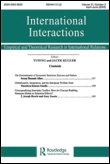
INTERNATIONAL INTERACTIONS
Fostering Interdisciplinary Dialogue in Global AffairsINTERNATIONAL INTERACTIONS, published by Routledge Journals, Taylor & Francis Ltd, is a prestigious scholarly journal that provides a vital platform for the dissemination of research within the fields of Political Science and International Relations. With an impactful history spanning from 1974 to 2024, this journal has established its prominence by being ranked Q1 in its category for 2023, alongside a commendable Scopus ranking of #191 out of 706, positioning it in the 73rd percentile among peers. Although it currently does not offer Open Access, INTERNATIONAL INTERACTIONS remains an essential resource for researchers and practitioners who seek to delve into complex global issues through a rigorous academic lens. The journal fosters interdisciplinary dialogue and engages with pressing challenges in international affairs, making it indispensable for those dedicated to advancing knowledge in the dynamic landscape of global interactions.
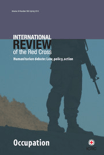
International Review of the Red Cross
Fostering interdisciplinary insights for a better tomorrow.The International Review of the Red Cross, published by Cambridge University Press, serves as a premier platform for discourse in humanitarian law, humanitarian action, and international relations. With its ISSN 1816-3831 and E-ISSN 1607-5889, this esteemed journal covers a broad range of topics at the intersection of law, sociology, and political science, making it an essential resource for researchers, practitioners, and students alike. Currently maintaining a commendable impact factor and sitting in Q2 within its respective categories, the journal demonstrates its significant contribution to scholarly conversations, ranking #426 out of 1025 in Social Sciences - Law and #773 out of 1466 in Sociology and Political Science in 2023. The journal has been converging its critical insights and academic rigor since 2005 and will continue until 2024, fostering an environment for innovative research and interdisciplinary approaches. Engaging with open access content, it provides invaluable perspectives that shape policy and practice in humanitarian efforts on a global scale.

QUEENS LAW JOURNAL
Catalyzing Conversations on Contemporary Legal IssuesQUEENS LAW JOURNAL is a prestigious legal journal published by Queen's University, Faculty of Law, located in Kingston, Ontario, Canada. With its ISSN 0316-778X, the journal serves as a key platform for academic discourse and research in the field of law, encompassing various disciplines such as criminal law, constitutional law, and international law. Although currently not available as Open Access, the QUEENS LAW JOURNAL maintains a strong reputation for publishing impactful research, making it a vital resource for legal scholars, practitioners, and students alike. By fostering an environment for innovative legal theories and critical analyses, the journal plays an essential role in advancing legal scholarship and promoting informed discussions on pertinent legal issues. Emphasizing quality and rigor, the QUEENS LAW JOURNAL is a valuable addition to any academic library and serves as a trusted reference for those engaged in the legal profession.
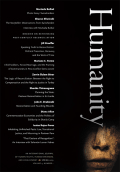
Humanity-An International Journal of Human Rights Humanitarianism and Development
Advancing the discourse on human rights and humanitarianism.Humanity: An International Journal of Human Rights, Humanitarianism and Development is a leading academic journal published by University of Pennsylvania Press, dedicated to the intricate intersections of human rights, humanitarian issues, and sustainable development. With its ISSN 2151-4364 and E-ISSN 2151-4372, the journal is pivotal in promoting interdisciplinary research that addresses social justice and global challenges. Operating from the heart of the United States, specifically at Journals Division, 3905 Spruce Street, Philadelphia, PA 19104, Humanity aims to foster dialogue among researchers, practitioners, and policymakers. It boasts a commendable position with Q3 rankings in the fields of Law, and Sociology and Political Science for 2023, alongside Scopus rankings that reflect its strong academic impact. While primarily subscription-based, the journal dedicates itself to producing high-quality research that resonates with contemporary issues, making it a crucial resource for researchers, professionals, and students seeking to engage with the latest developments in human rights and humanitarian discourse.

Ius Canonicum
Empowering Researchers with Critical Perspectives on Law.Ius Canonicum is a distinguished academic journal published by UNIV NAVARRA, SERVICIO PUBLICACIONES, based in Spain. With an ISSN of 0021-325X and an E-ISSN of 2254-6219, the journal serves as a vital platform for scholars, researchers, and students delving into the realms of Law and Religious Studies. Recognized within the Scopus rankings, it holds a commendable position at Rank #120 in Religious Studies and Rank #540 in Law, reflecting its strong impact and relevance, particularly evident in its Q2 and Q3 category quartiles for 2023. Ius Canonicum seeks to foster international discourse on ecclesiastical law while providing critical insights into the evolving interpretations and applications of canonical principles. Despite its traditional publication model, the journal remains pivotal in advancing scholarly dialogue within its converged years from 2016 to 2024, serving as an invaluable resource for those engaged in legal studies and the theological dimensions of law.
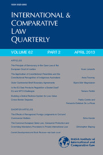
International & Comparative Law Quarterly
Navigating the Intersection of Law and Politics.International & Comparative Law Quarterly is a prestigious academic journal published by Cambridge University Press, renowned for its rigorous scholarship in the fields of law, political science, and international relations. With an impressive impact factor and classified in the Q1 category for both Law and Political Science and International Relations, the journal stands out as a leading platform for disseminating high-quality research. Established in 1952, it has been pivotal in shaping discourse around comparative and international legal frameworks through carefully curated articles, case studies, and analyses. Although not open access, its comprehensive content provides invaluable insights into contemporary legal challenges and political dynamics, making it essential reading for researchers, professionals, and students alike. With ongoing contributions from a diverse range of scholars, the journal aims to foster a deeper understanding of law in a global context and provide readers with the tools to navigate complex legal landscapes.
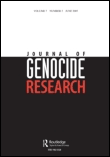
Journal of Genocide Research
Uncovering truths behind atrocities for a better tomorrow.Journal of Genocide Research is a leading academic publication dedicated to the interdisciplinary study of genocide, showcasing significant research and critical discourse within the fields of history, law, political science, and sociology. Published by ROUTLEDGE JOURNALS, TAYLOR & FRANCIS LTD in the United Kingdom, this esteemed journal boasts a remarkable impact factor and ranks in the first quartile for history and the second for law as of 2023, reflecting its commitment to rigorous scholarship. With a comprehensive scope covering significant historical atrocities and their implications, the journal provides a vital platform for researchers, professionals, and students to engage with contemporary issues surrounding human rights and international relations. The Journal of Genocide Research continues to evolve, fostering an essential dialogue on often-overlooked subjects from its inception in 1999 through to 2024 and beyond, making it an indispensable resource for advancing the understanding of genocide and its societal impacts.
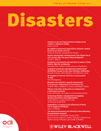
DISASTERS
Transforming disaster understanding through academic collaboration.DISASTERS, published by WILEY, is a premier academic journal dedicated to advancing the understanding of disasters across multiple disciplines, including Earth and Planetary Sciences and Social Sciences. With a historical publication span from 1977 to 2024, this journal has established itself as a vital resource within the academic community, boasting a Q1 category ranking in both fields, indicating its high impact and relevance. DISASTERS ranks impressively in Scopus, holding the #27 position in General Social Sciences and #36 in General Earth and Planetary Sciences, reflecting its influence in shaping disaster research and policy. The journal serves as a platform for interdisciplinary collaboration, offering researchers, professionals, and students critical insights into disaster management, response strategies, and risk reduction measures. Although it is not an Open Access journal, DISASTERS remains a cornerstone for those looking to contribute to and stay informed about the evolving landscape of disaster studies.

Utrecht Journal of International and European Law
Connecting Scholars Across BordersUtrecht Journal of International and European Law, published by UBIQUITY PRESS LTD, serves as a dynamic platform for the dissemination of scholarly research in the realms of international and European law. Since its inception as an open-access journal in 2013, it has provided unrestricted access to cutting-edge legal scholarship, fostering global dialogue among legal professionals, researchers, and students. With a notable Scopus rank of 249 out of 1,025 in the law category and a commendable Q3 rating, the journal emphasizes innovative legal theories and practices relevant to contemporary global challenges. Located in the heart of the United Kingdom, the Utrecht Journal is committed to maintaining high academic standards while also promoting the exchange of knowledge across borders, which is crucial given the ever-evolving landscape of international law. As it converges its focus from 2020 to 2024, the journal seeks to become an essential reference for those dedicated to the exploration and expansion of legal discourse in this vital field.
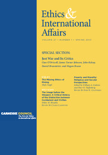
Ethics & International Affairs
Exploring the Moral Compass of Global PoliticsEthics & International Affairs is a leading peer-reviewed journal published by Cambridge University Press, offering critical insights at the intersection of ethics, philosophy, and international relations. Established in 1987 and reflecting a robust commitment to interdisciplinary scholarship, the journal aims to foster dialogue on pressing ethical issues in global affairs, addressing topics from military intervention to humanitarian aid. With an impressive Scopus ranking that places it in the 85th percentile for Philosophy and the 64th percentile for Political Science and International Relations, Ethics & International Affairs has established itself as a cornerstone publication within academic circles. Although the journal is not Open Access, it remains accessible through academic institutions and libraries. The journal provides a platform for researchers, professionals, and students alike to contribute to and engage with the evolving discourse on ethical challenges in international contexts, making it an essential resource for anyone looking to deepen their understanding of the moral dimensions of global politics.